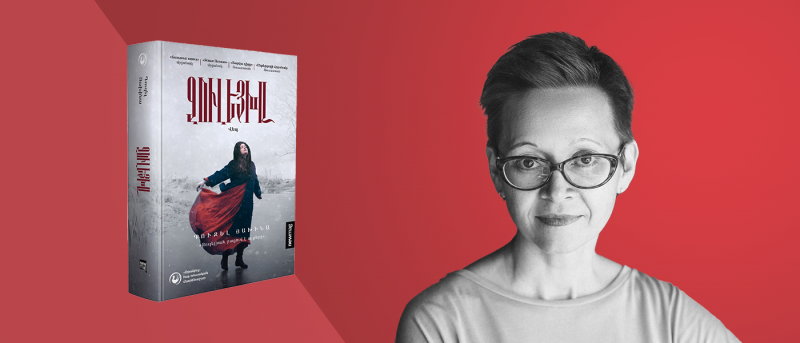Interview with Guzel Yakhina. How and why she has written the "Echelon to Samarkand"? (video)

The "Echelon to Samarkand" by Guzel Yakhina is the most anticipated and criticized Russian novel of 2021. Critics accused the writer of distorting historical facts and plagiarism. Here is the interview with Guzel Yakhina to Newmag.
Echelon as the Noah’s Arc
The novel "Echelon to Samarkand" is about an ark, an echelon, a train, in which 500 starving, half-dead children were transported in the early 20s of the previous century. Some of them died. Those children were taken from the starving areas of the Volga region to Samarkand, Turkistan, where, according to rumors, there was plenty of bread, plenty of sun and plenty of warmth. And the children would have a chance to live.
That journey lasts six weeks, it stretches more than four thousand kilometers. Along the way the children and the leader of the echelon face many adventures. And all that, of course, is about salvation, because the children leave the areas where death and hunger rule. This is a road from hunger and death to life. However, there are many painful developments ahead for these 5, 6, and 9-year-old children. They will face the famine of the 30s, those who will grow up will see Stalin’s repressions, and most importantly, they will face the Second World War. You will read all that in parentheses.
Historical novel or fiction?
The echelon I describe did not exist. But there have been similar echelons. This is a page of history that is not widely known. But if you search in the archives, you will find this topic very quickly. They were called “Derzhinsky” echelons. I have a deep personal attitude towards them. It's part of my family history. My paternal grandfather was transported from Kazan to Turkistan, not to Samarkand, but to another city in the 20s, but it is not so important. My grandfather was an orphan, he was a wanderer, and he was starving. Along with him, other boys were also on that train. Some of them died on the way, which took several weeks. Fortunately for me, my grandfather survived. So, such trains existed, and thanks to one of them, my family exists.
A criticized novel
Any text, film, or artwork that critically addresses the Soviet past tends to attract significant attention. The criticism of the book was mainly because of that acute perception. My conscience is clear, I worked hard, researched many sources. Everything I wrote is based on the materials I found.
Spare the reader.
When I was preparing to write this book, I read a lot. I spent weeks studying this stuff. At some point it became clear that the materials were unbearable. Reading the reports, children's testimonies, newspapers, looking at the photos, delving into those inhuman materials, I realized that I wanted to put them aside and not write about them at all. I realized that the reader can also close the book in the same way and not read. And it is important for me that they read. I spent a lot of time and energy to make those weights equal. On the one hand, there were unbearable materials that a healthy human mind refuses to accept. the photos of all those poor and starving children, swollen from hunger and at the same time exhausted to the bone. Those photos are just deplorable. Children who die in bed, those who lie down and cannot get up. On one side of the scale was the unbearable subject, and on the other side I tried to put everything possible: two love stories, in one case passionate, in another case more maternal, gentle and soft, the friendship of children.
Hunger through the eyes of adults
There is the autistic Zagreika. In his sick imagination, his ideas and everything he sees around him are mixed up. The other is Senya Chuvashin. He dies of hunger and before dying we see the last few hours and minutes of his life. In these two episodes, I presented reality through the eyes of children. In other cases, I show famine through the eyes of adults. It was a conscious choice. I wanted to show hunger as something terrible, as something not normal.
Guzel Yakhina to the Armenian reader
I thank everyone who read my first novel. I will be happy if they read the second one. This is a novel about our shared history. If my text helps someone better understand their grandparents, that would be great. After all, many people in Armenia also faced hunger. It is indeed one common misfortune, a pain that unites all of us.
Read also

At Winterfest 2026, Newmag will present Henrikh Mkhitaryan’s memoir “My Life Always at the Center” (trailer)

Winterfest to feature David Georgyan’s sci-fi action novel Impedance (trailer)

At Winterfest 2026, Newmag will present Marianna Hakobyan’s “Don’t Change the Names” (trailer)

Closing and Award Ceremony of the “Sprout in Armenian – 2025” Competition at Newmag Winterfest

